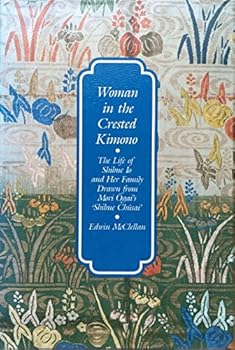Woman in the Crested Kimono: The Life of Shibue Io and Her Family
Select Format
Select Condition 
Book Overview
"The life of Shibue Io and her family, a kind of Japanese Buddenbrooks, may be unknown in the West, but her rich and engaging story marks the intersection of a remarkable woman with a fascinating time... This description may be from another edition of this product.
Format:Hardcover
Language:English
ISBN:0300034849
ISBN13:9780300034844
Release Date:January 1985
Publisher:Yale University Press
Length:192 Pages
Weight:0.35 lbs.
Customer Reviews
2 ratings
A Remarkable Woman
Published by Thriftbooks.com User , 16 years ago
This was a delightful read, one I'd come across by chance when it was mentioned in Hanley's Everyday Things in Premodern Japan. It tells the story of a woman named Shibue Io, who lived during the mid-19th century and died in the 1880s, her life spanning the late Edo period and the early Meiji. She was the wife of a scholar-physician named Shibue Chûsai, the subject of a long and very detailed biography by the great Meiji writer Mori Ôgai. McLellan, rather than translating Ôgai's book itself, extracted only those parts concerned with his remarkable wife, Io, and then interpolated his own musings and commentary on the woman and her times. He also provides excellent documentation in the form of endnotes, which give the book a necessary grounding in historical research. We follow the life and times of Io as she marries the well-respected Chûsai, bears a sizable brood (not all of whom lived long), raises and educates her children, is widowed, and endures the hardships that came to families associated with the samurai (or bushi) class during the time of the Meiji Restoration. This exceptional woman was extremely well educated for her time, and several of her children were themselves involved in scholarly pursuits. Io was not only intellectually inclined, she also--having been given martial arts training--had considerable physical bravery, as described in several vivid anecdotes. The book pursues the story of her husband, and each of her children, and by the time the volume concludes, after only 150 pages of narrative, we feel we have come to know not only Shibue Io, but her entire family, and a number of persons closely associated with the Shibue. Moreover, we get a marvelous picture of what life was like for an upper middle-class Japanese family living in Edo during the closing days of the shogunate, and how topsy-turvy things became when it had to adjust to the social, economic, and political upheavals surrounding and succeeding the Restoration. McLellan's commentary has just the right touch; knowledgeable and sensitive, and always helpful in engaging the reader's interest in and sympathy for the cast of characters whose story he (and Ôgai) is telling. He keeps the narrative clear, reminding the reader of who individuals are when they reappear in the story, and continually offering valuable insights into the cultural and historical circumstances of the times, including the place of women. This is a book that anyone interested in 19th-century Japanese life should read; since it was published in 1985, I regret not having known of it before, but I'm delighted to have finally made its acquaintance.
Woman with a "keen mind, fearless spirit"
Published by Thriftbooks.com User , 24 years ago
Working from Mori Ogai's biography of Shibue Chusai, a 19th century Japanese doctor in service to the Tsugaru Shogunate, the author of this book focuses rather on the extraordinary life of his wife, Io. Supplementing Ogai's text with his own research, McClellan covers the span of her difficult and remarkable life from her marriage to Chusai, the births (and deaths) of her children, the death of Chusai, and her latter days spent moving all over Japan with her family, trying to eke out a meager living. Japan at this time was going through significant changes as power was wrested from feudal landlords and "restored" to the Emperor Meiji. As a result, Io's entire life changed; born to privilege and affluence, she and her family lost both their status and their income in the restoration. What is amazing about Io is how unconventional she is, and how her story resists the stereotype of the demure, powerless woman (especially in 19th century Japan). Io is not afraid to carry a dagger and pull it out and threaten to use it on thugs who would harm her. And after her husband's death she declines invitations to live with relatives, opting instead to maintain her autonomy even with its threat of greater poverty. She is exceptionally well educated, and learns to read English in her sixties. But McClellan is also careful to place Io's story within its historical context, reminding us of the real limitations she faced because of her sex. He still surmises, however, on her opinions on the issues affecting her quickly changing society, such as women's voting rights and Western scholarship. Above all, Io is portrayed as a woman who combines qualities of strength and courage with tolerance. These are the exact qualities one needed to survive in the world she inhabited, and her possession of them ensured, no doubt, her remarkable success.





